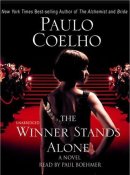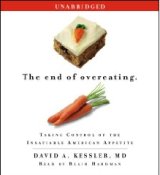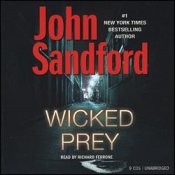June
2009
AUDIO BOOK REVIEWS
AND AN INTERVIEW WITH CLIVE CUSSLER
by Jonathan Lowe
 Dave Cullen spent a decade researching
COLUMBINE for release on the anniversary
of the tragic high school attack. The
effort shows, and with as much dispassionate
authority as an episode of Frontline.
How were two antisocial students able
to plan and execute this act of terror,
utilizing multiple guns and explosive
devices, without attracting attention?
How and why did the media get the facts
wrong? Culler busts the myths prevalent
at the time, exposing a complicity of
ignorance in stereotyping the killers.
They were not gang members or vindictive
outcasts seeking revenge on certain school
jocks. Dylan Klebold was a manic depressive
consumed by self loathing, and Eric Harris
a charming psychopath craving the destruction
of society itself. Both kids wanted and
intended to die in a blaze of "glory."
Planned as more than a mere shooting,
the attack would have produced many more
than 13 casualties had the boys' bombs
actually worked. Not satisfied with mere
reportage, Cullen lays out all the ethical
and sociological arguments inherent in
the case. Narrated by Don Leslie to engaging
effect, the audiobook version moves like
an inexorable lawnmower, covering parallel
ground from all points of view so as to
cut down all the high grass and weed out
the hidden bugs. Why do these tragedies
happen? Because we fail to apprehend the
hidden complexities of disturbed young
people weaned on sex, violence, and apathetic
materialism. (Blackstone Audio; 14
hours unabridged on 1 Mp3 disk)
Dave Cullen spent a decade researching
COLUMBINE for release on the anniversary
of the tragic high school attack. The
effort shows, and with as much dispassionate
authority as an episode of Frontline.
How were two antisocial students able
to plan and execute this act of terror,
utilizing multiple guns and explosive
devices, without attracting attention?
How and why did the media get the facts
wrong? Culler busts the myths prevalent
at the time, exposing a complicity of
ignorance in stereotyping the killers.
They were not gang members or vindictive
outcasts seeking revenge on certain school
jocks. Dylan Klebold was a manic depressive
consumed by self loathing, and Eric Harris
a charming psychopath craving the destruction
of society itself. Both kids wanted and
intended to die in a blaze of "glory."
Planned as more than a mere shooting,
the attack would have produced many more
than 13 casualties had the boys' bombs
actually worked. Not satisfied with mere
reportage, Cullen lays out all the ethical
and sociological arguments inherent in
the case. Narrated by Don Leslie to engaging
effect, the audiobook version moves like
an inexorable lawnmower, covering parallel
ground from all points of view so as to
cut down all the high grass and weed out
the hidden bugs. Why do these tragedies
happen? Because we fail to apprehend the
hidden complexities of disturbed young
people weaned on sex, violence, and apathetic
materialism. (Blackstone Audio; 14
hours unabridged on 1 Mp3 disk) |
 Speaking
of apathetic materialism, Paulo Coelho,
author of The Alchemist, has written a
new novel excoriating the vain and idle
rich. Titled THE WINNER STANDS ALONE,
the book chronicles one day in the life
of a mad Russian entrepreneur at the Cannes
Film Festival as he murders people in
order to attract the attention of his
estranged wife, who has proved to be unfaithful.
We use the word "mad" to describe him
since no sane person would imagine that
shooting a needle dipped in curare to
kill a film producer would ultimately
convince one's wife that he's a great
guy with whom to spend the rest of her
life. While the book is interesting to
listen to, particularly given the understated
performance of actor Paul Boehmer, it's
basically a reaffirmation that the rich
are not like you or me, and that maybe
we shouldn't be so entranced by a lifestyle
achieved through ruthless pragmatism.
Ironically enough, Coelho is now a multi-millionaire
with a film deal himself, inspiring awe
among those so inclined. We'll have to
wait and see if he donates his money to
charity or buys a yacht to park off Cannes.
(Blackstone Audio; 12 hours unabridged
on 1 Mp3 disk) Speaking
of apathetic materialism, Paulo Coelho,
author of The Alchemist, has written a
new novel excoriating the vain and idle
rich. Titled THE WINNER STANDS ALONE,
the book chronicles one day in the life
of a mad Russian entrepreneur at the Cannes
Film Festival as he murders people in
order to attract the attention of his
estranged wife, who has proved to be unfaithful.
We use the word "mad" to describe him
since no sane person would imagine that
shooting a needle dipped in curare to
kill a film producer would ultimately
convince one's wife that he's a great
guy with whom to spend the rest of her
life. While the book is interesting to
listen to, particularly given the understated
performance of actor Paul Boehmer, it's
basically a reaffirmation that the rich
are not like you or me, and that maybe
we shouldn't be so entranced by a lifestyle
achieved through ruthless pragmatism.
Ironically enough, Coelho is now a multi-millionaire
with a film deal himself, inspiring awe
among those so inclined. We'll have to
wait and see if he donates his money to
charity or buys a yacht to park off Cannes.
(Blackstone Audio; 12 hours unabridged
on 1 Mp3 disk) |
 It has been said that a large percentage
of the population would rather die than
give a speech in public. Not Jeffrey Gitomer,
for sure. In his new book is GETTING YOUR
WAY, Gitomer advises joining Toastmasters,
recording yourself, and offering to give
presentations whenever and wherever possible.
Subtitle of the book is "How to Speak,
Write, Present, Persuade, Influence, and
Sell Your Point of View to Others." He
says nothing about how to determine whether
your point of view is the correct one
to take. He assumes that you're a thinking
professional with a well defined agenda,
wanting to persuade others to buy what
you're selling. This "Little Green Book"
is a followup to the bestselling "Little
Red Book of Selling," and naturally it
is narrated by the author, who uses his
congenial persuasive ability to convince
you to drop the fear and stand up behind
that podium, soap box, or supervisor's
desk and lay out your case. Or get in
the casket. Your choice—but just
be sure that, if you do decide to give
a speech, you don't memorize it. Rather,
know the material cold, anticipate questions
or objections, interject humor, and understand
your audience. Simple enough, right? Well,
maybe you should keep an outline handy
just in case you forget your own name.
(Simon & Schuster Audio; 4 hours unabridged)
It has been said that a large percentage
of the population would rather die than
give a speech in public. Not Jeffrey Gitomer,
for sure. In his new book is GETTING YOUR
WAY, Gitomer advises joining Toastmasters,
recording yourself, and offering to give
presentations whenever and wherever possible.
Subtitle of the book is "How to Speak,
Write, Present, Persuade, Influence, and
Sell Your Point of View to Others." He
says nothing about how to determine whether
your point of view is the correct one
to take. He assumes that you're a thinking
professional with a well defined agenda,
wanting to persuade others to buy what
you're selling. This "Little Green Book"
is a followup to the bestselling "Little
Red Book of Selling," and naturally it
is narrated by the author, who uses his
congenial persuasive ability to convince
you to drop the fear and stand up behind
that podium, soap box, or supervisor's
desk and lay out your case. Or get in
the casket. Your choice—but just
be sure that, if you do decide to give
a speech, you don't memorize it. Rather,
know the material cold, anticipate questions
or objections, interject humor, and understand
your audience. Simple enough, right? Well,
maybe you should keep an outline handy
just in case you forget your own name.
(Simon & Schuster Audio; 4 hours unabridged) |
 A former FDA commissioner has written
a scientific explanation of why dieters
find it so difficult to lose weight. THE
END OF OVEREATING: TAKING CONTROL OF THE
INSATIABLE AMERICAN APPETITE by David
Kessler is read by Blair Hardman. This
could be a thriller involving conspiracies
within the food industry, since the method
here is similar to what the tobacco industry
did in duping the smoker, and so the truth
is also more frightening. Like Pavlov's
dogs, we have been conditioned to overeat
by those who want to sell the most highly
processed, nutritionally vacant foods.
Indeed, our brains set up patterns that
are easily repeated. If sugar, fat, and
salt are layered in just the right combination,
our reward mechanism is triggered, while
ads on TV call to us like siren songs.
Can we restore our self regulating system,
and regain control of eating? Kessler
shows how with Blair Hardman's help. (Simon
& Schuster Audio; 7 hours unabridged)
A former FDA commissioner has written
a scientific explanation of why dieters
find it so difficult to lose weight. THE
END OF OVEREATING: TAKING CONTROL OF THE
INSATIABLE AMERICAN APPETITE by David
Kessler is read by Blair Hardman. This
could be a thriller involving conspiracies
within the food industry, since the method
here is similar to what the tobacco industry
did in duping the smoker, and so the truth
is also more frightening. Like Pavlov's
dogs, we have been conditioned to overeat
by those who want to sell the most highly
processed, nutritionally vacant foods.
Indeed, our brains set up patterns that
are easily repeated. If sugar, fat, and
salt are layered in just the right combination,
our reward mechanism is triggered, while
ads on TV call to us like siren songs.
Can we restore our self regulating system,
and regain control of eating? Kessler
shows how with Blair Hardman's help. (Simon
& Schuster Audio; 7 hours unabridged) |
 In WICKED PREY by John Sandford a family
in Wisconsin is murdered by the "Iceman,"
a killer whose identity is a mystery blurred
by the ice sheets of winter. Contrasts
abound, as the killer also likes to burn
things. Lucas Davenport, Sandford's ex
Minneapolis cop, arrives amid all the
local buzz, and gets on the killer's track
while dabbling in a romance with a local
doctor. Although the ending is something
of a letdown, the novel is quite observant
and multi-faceted, and as such lends itself
to the careful appraisal inherent in the
tone of longtime Sandford mystery reader
Richard Ferrone. (Penguin Audio; 6
hours abridged)
In WICKED PREY by John Sandford a family
in Wisconsin is murdered by the "Iceman,"
a killer whose identity is a mystery blurred
by the ice sheets of winter. Contrasts
abound, as the killer also likes to burn
things. Lucas Davenport, Sandford's ex
Minneapolis cop, arrives amid all the
local buzz, and gets on the killer's track
while dabbling in a romance with a local
doctor. Although the ending is something
of a letdown, the novel is quite observant
and multi-faceted, and as such lends itself
to the careful appraisal inherent in the
tone of longtime Sandford mystery reader
Richard Ferrone. (Penguin Audio; 6
hours abridged) |
 Finally, Clive Cussler, with the aid of
several co-writers, has been churning
out adventure novels for over three decades.
His thirty-eighth book is MEDUSA, a Kurt
Austin suspense written with Paul Kemprecos
(a professional diver and undersea mystery
author). Depending on whether you prefer
the bare bones action sequences or the
full text (with more character development),
you may choose the abridged version as
narrated by actor Richard Ferrone, or
the unabridged as read by veteran Scott
Brick. The plot involves the disappearance
of an undersea lab conducting experiments
on a rare jellyfish that can provide vaccine
for a deadly virus. The Chinese underworld
is involved, and with all the plot twists
of a James Bond film. Ferrone is used
to narrating mysteries, and so is best
suited for laying out those elements in
a straightforward manner with an air of
curiosity, while Brick conveys an element
of awe to the proceedings in telling the
full story. Either way, it's typical Cussler,
and an escape from the more mundane (if
more relevant) aspects of real life chronicled
by those with higher literary aspirations.
(Penguin Audio; 6 and 13 hours, respectively)
Finally, Clive Cussler, with the aid of
several co-writers, has been churning
out adventure novels for over three decades.
His thirty-eighth book is MEDUSA, a Kurt
Austin suspense written with Paul Kemprecos
(a professional diver and undersea mystery
author). Depending on whether you prefer
the bare bones action sequences or the
full text (with more character development),
you may choose the abridged version as
narrated by actor Richard Ferrone, or
the unabridged as read by veteran Scott
Brick. The plot involves the disappearance
of an undersea lab conducting experiments
on a rare jellyfish that can provide vaccine
for a deadly virus. The Chinese underworld
is involved, and with all the plot twists
of a James Bond film. Ferrone is used
to narrating mysteries, and so is best
suited for laying out those elements in
a straightforward manner with an air of
curiosity, while Brick conveys an element
of awe to the proceedings in telling the
full story. Either way, it's typical Cussler,
and an escape from the more mundane (if
more relevant) aspects of real life chronicled
by those with higher literary aspirations.
(Penguin Audio; 6 and 13 hours, respectively) |
| LOWE: Tell us about your
collaborations with other writers.
CUSSLER: They are spinoff
series. I come up with most of the plotting
and they'll start the writing, and I'll
edit, that sort of thing.
LOWE: So you switch off with
Craig Dirgo or Paul Kemprecos or Jack
Du Brul.
CUSSLER: Right. We did a fiction
book which has nothing to do with NUMA
or Pitt or anything. In one book, "Flood
Tide," I had this ship that looked like
an old beat up tramp steamer, had all
the exotic gear, and people who ran
it were like corporate mercenaries,
they go around the world, like a Mission
Impossible plot.
LOWE: Where did the name Dirk
Pitt come from?
CUSSLER: My son's name. He
was six months old when I started writing.
His name is Dirk, and I used it for
fun, really. I was looking through an
encyclopedia about the British prime
ministers during the Revolutionary war,
Pitt the younger and Pitt the elder.
So I thought, well, that works, 'cause
I wanted a one syllable name.
LOWE: I was thinking, you know,
like one letter less than James Bond,
and easier to type than Brandon Tartikoff
or something.
CUSSLER: (laughs) Well, that's
it. It's easier to say "Pitt jumped
over the wall" than that. I think that's
why Fleming wanted a simple name. James
Bond. There was an ornithologist by
that name too. |
|





